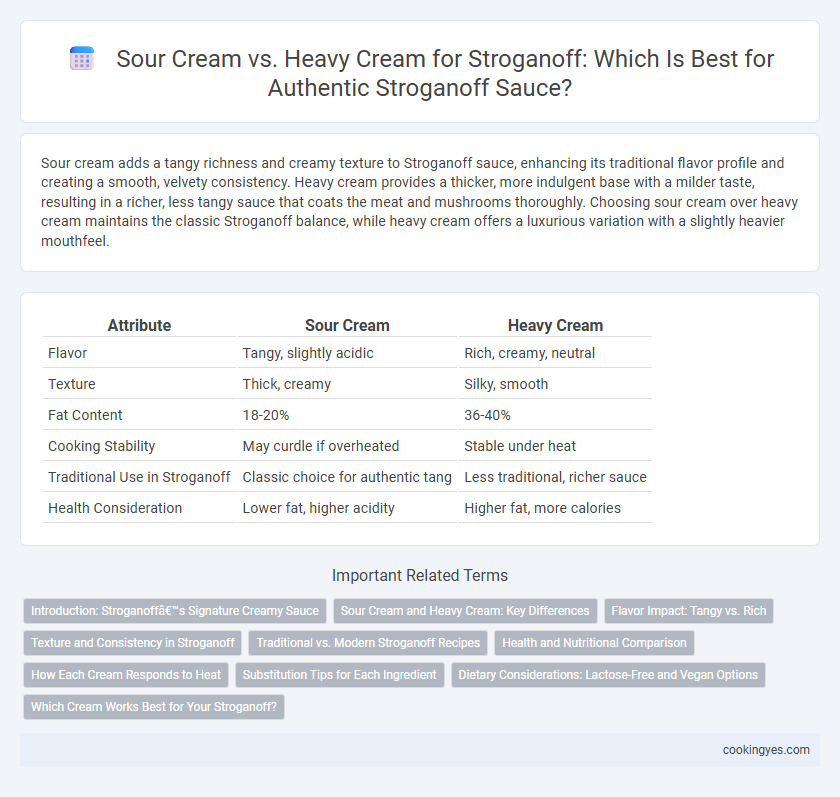Sour cream adds a tangy richness and creamy texture to Stroganoff sauce, enhancing its traditional flavor profile and creating a smooth, velvety consistency. Heavy cream provides a thicker, more indulgent base with a milder taste, resulting in a richer, less tangy sauce that coats the meat and mushrooms thoroughly. Choosing sour cream over heavy cream maintains the classic Stroganoff balance, while heavy cream offers a luxurious variation with a slightly heavier mouthfeel.
Table of Comparison
| Attribute | Sour Cream | Heavy Cream |
|---|---|---|
| Flavor | Tangy, slightly acidic | Rich, creamy, neutral |
| Texture | Thick, creamy | Silky, smooth |
| Fat Content | 18-20% | 36-40% |
| Cooking Stability | May curdle if overheated | Stable under heat |
| Traditional Use in Stroganoff | Classic choice for authentic tang | Less traditional, richer sauce |
| Health Consideration | Lower fat, higher acidity | Higher fat, more calories |
Introduction: Stroganoff’s Signature Creamy Sauce
Stroganoff's signature creamy sauce balances rich flavors by using sour cream, which adds a tangy depth and smooth texture that heavy cream alone cannot provide. Sour cream's acidity enhances the savory notes of beef and mushrooms, creating a distinctive, velvety mouthfeel essential to authentic Stroganoff. Heavy cream contributes richness but lacks the subtle tartness that defines the classic sauce's complexity.
Sour Cream and Heavy Cream: Key Differences
Sour cream adds a tangy flavor and thicker texture to Stroganoff sauce, enhancing its richness and providing a slight acidity that balances the dish's savory elements. Heavy cream contributes a smooth, creamy consistency with a neutral taste, making the sauce silkier but less tangy compared to sour cream. Choosing sour cream is ideal for authentic Stroganoff flavor, while heavy cream offers a milder, creamier alternative.
Flavor Impact: Tangy vs. Rich
Sour cream adds a distinct tangy flavor to Stroganoff sauce that brightens the dish, providing a subtle acidity that balances the richness of the beef and mushrooms. Heavy cream contributes a smoother, richer texture and flavor, creating a velvety sauce without the sharpness found in sour cream. Choosing sour cream enhances complexity with its zesty notes, while heavy cream offers a luxurious, mellow finish.
Texture and Consistency in Stroganoff
Sour cream imparts a rich, tangy flavor with a creamy, slightly thinner consistency that enhances Stroganoff sauce's smooth texture without overpowering other ingredients. Heavy cream provides a thicker, velvety texture that creates a luxurious, luscious sauce with a more neutral taste, allowing the beef and mushrooms to remain the focal point. Choosing sour cream results in a lighter, tangier sauce, whereas heavy cream delivers a denser, richer mouthfeel, affecting the final Stroganoff's overall texture and consistency.
Traditional vs. Modern Stroganoff Recipes
Traditional Stroganoff recipes rely on sour cream to achieve the dish's signature tangy and creamy sauce, enhancing the flavor and providing a slightly thickened texture. Modern adaptations often use heavy cream to create a richer, smoother sauce with less acidity, catering to contemporary palates seeking a more luxurious mouthfeel. Sour cream imparts a distinctive sharpness crucial in classic Stroganoff, while heavy cream offers a milder, creamier consistency preferred in modern variants.
Health and Nutritional Comparison
Sour cream offers a tangy flavor and contains probiotics that support gut health, making it a nutritious option for Stroganoff sauce. Heavy cream has a higher fat content and more calories per serving, which can increase saturated fat intake and impact heart health if consumed excessively. Choosing sour cream can reduce calorie density and provide beneficial nutrients, while heavy cream delivers a richer, creamier texture but with greater fat and calorie content.
How Each Cream Responds to Heat
Sour cream tends to curdle when exposed to high heat, making it less stable for prolonged simmering in Stroganoff sauce, while heavy cream maintains a smooth texture due to its higher fat content. Using heavy cream results in a richer, creamier sauce that withstands extended cooking without separating. Sour cream, added off the heat or at the end of cooking, contributes tanginess but requires careful temperature control to avoid curdling.
Substitution Tips for Each Ingredient
Sour cream adds a tangy richness to Stroganoff sauce while heavy cream provides a smoother, creamier texture without acidity. When substituting sour cream, use Greek yogurt or creme fraiche to maintain the tangy flavor and avoid curdling during cooking. For heavy cream alternatives, half-and-half mixed with butter or evaporated milk can replicate the creamy consistency while reducing fat content.
Dietary Considerations: Lactose-Free and Vegan Options
Sour cream in Stroganoff sauce offers a tangy flavor but typically contains lactose, posing challenges for lactose-intolerant individuals, while heavy cream has a richer texture but also includes lactose. For lactose-free options, plant-based alternatives like coconut cream or cashew cream can replace traditional dairy, maintaining creaminess without lactose. Vegan Stroganoff sauces often utilize almond or soy-based creams to replicate the sauce's silky consistency while adhering to dietary restrictions.
Which Cream Works Best for Your Stroganoff?
Sour cream delivers the classic tangy flavor and creamy texture essential to authentic Stroganoff sauce, enhancing its richness without overpowering the dish. Heavy cream offers a milder, smoother consistency but lacks the subtle acidity that balances the savory beef and mushrooms. For traditional Stroganoff, sour cream works best, providing the perfect harmony of creaminess and tang to elevate the sauce.
Sour cream vs heavy cream for Stroganoff sauce Infographic

 cookingyes.com
cookingyes.com